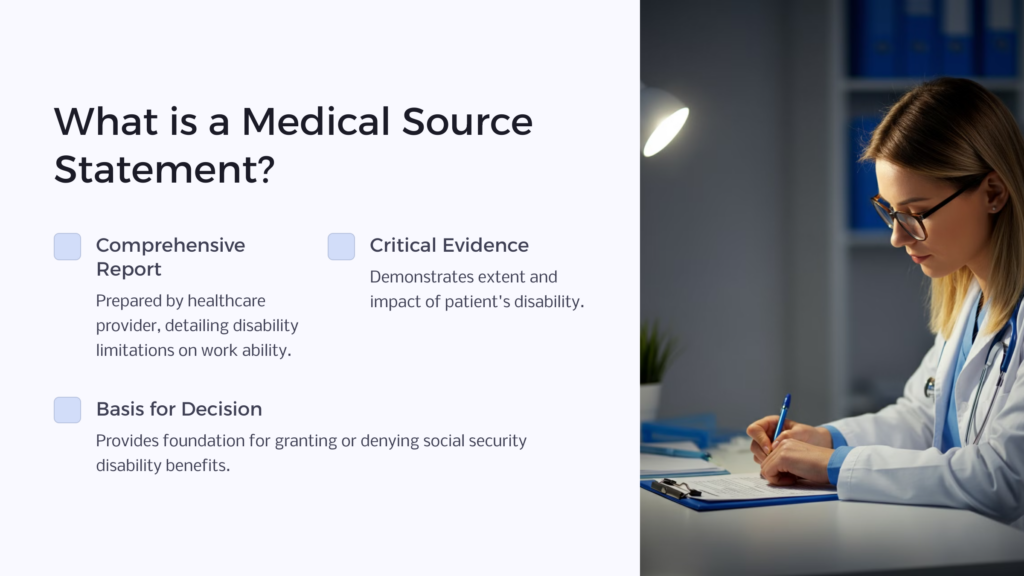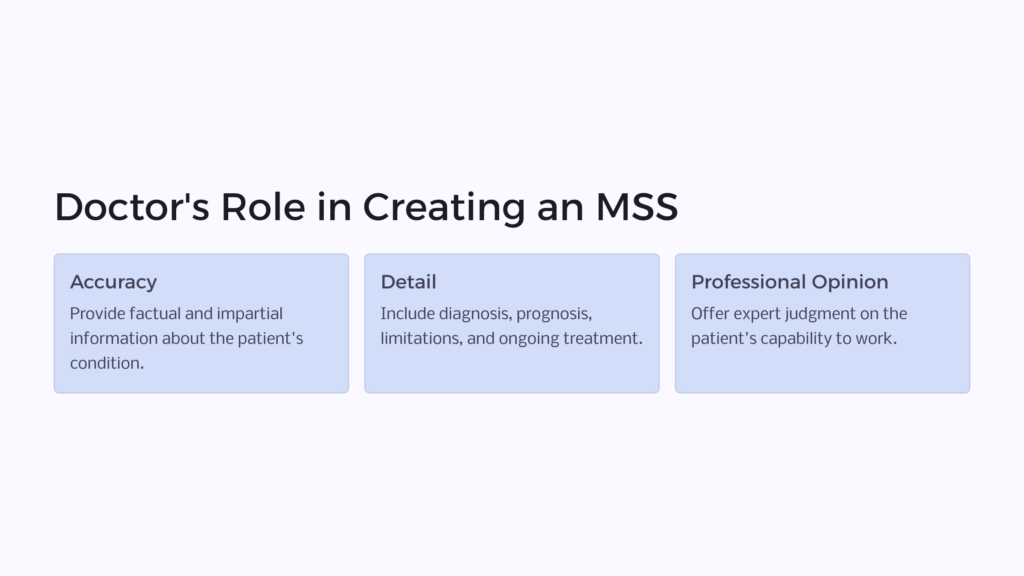In the complicated and often lengthy process of disability cases, one particular piece of documentation plays an influential role in determining the outcome of the case—the Medical Source Statement (MSS). This document, prepared by the claimant’s doctor, can often be the difference between a successful claim or a rejection. Understanding its use and how to adequately obtain and prepare it may tip the scales in favor of those who are genuinely in need of assistance due to disability.
Definition and Importance of Medical Source Statement

A Medical Source Statement (MSS) is a comprehensive report prepared by the claimant’s healthcare provider that comprehensively describes the limitations a disability places on the claimant’s ability to perform work. It is more than just an ordinary medical report; an MSS delves further as it highlights specific chores a patient might or might not be able to do due to their condition. This makes the MSS a critical component in disability cases, as it serves as a compelling piece of evidence demonstrating the extent and impact of the patient’s disability.
The role of an MSS in social security disability cases, therefore, cannot be understated. The medical assessment carried in this document provides the basis upon which social security disability benefits are granted or denied. Not only does it outline the diagnosis and treatment course, but it also displays the extent of the patient’s impairment, therefore, hinting on their ability to work. An MSS paints an in-depth picture of a patient’s health status and organizes medical facts into a document that disability determination services can understand and act upon.
The Process of Obtaining a Medical Source Statement

To acquire an MSS, it is essential to approach your primary healthcare provider directly, typically your physician. This process should be undertaken with care; clearly explain why you need the statement as medical evidence and discuss the medical records that are mandatory for inclusion. It is important to ensure that the doctor understands what is at stake and what a comprehensive MSS might mean for your case.
The doctor’s role is significant in this process. Not only should they provide factual and impartial information, but they are also obliged to work in the best interest of their patient. This can be a delicate balancing act, requiring professional judgment and sound medical ethics.
In terms of when to expect the MSS, it typically differs based on the complexity of the patient’s medical condition. For simple disabilities, it might take a matter of days or weeks to gather a full medical record. However, for more complex cases involving numerous tests, procedures, or specialists, it may require more time to obtain all necessary medical records.
Guidelines for Doctors in Creating an MSS

Creating an effective MSS requires the healthcare provider to be careful, detailed and honest. Correctly completed MSS holds significant relevance because of its potential impact on a patient’s welfare. The medical record should be accurate and fully detail the patient’s medical condition, including their diagnosis, prognosis, physical or mental limitations, ongoing treatment, and the doctor’s opinion on the patient’s capability to work.
The doctor’s professional medical opinion carries significant weight in a disability evaluation. A well-informed opinion coming from an experienced physician can carry immense influence over a disability case.
How the Social Security Administration Uses the MSS
Once the MSS is ready, the Social Security Administration (SSA) becomes the primary user of this document. The SSA uses the MSS to determine whether the patient qualifies for disability benefits. The SSA gives the MSS substantial consideration when evaluating claims since it provides a comprehensive view of the claimant’s disability and the impact of their capacity to work. The doctor’s statement backed by their medical judgment is a formidable input during the evaluation.
Mistakes to Avoid When Requesting an MSS

Given the significant role an MSS plays in a disability case, avoiding common pitfalls becomes crucial. One mistake that’s common is unclear or open-ended statements by the doctor. To be an acceptable medical source, the document’s details should be concise, precise, and qualitative to leave no room for misinterpretation. Similarly, misinformation or dishonesty could not only lead to rejection but potential legal implications.
Timing is also essential. Timely requests and subsequent follow-ups with the doctor are vital to ensure that the MSS is ready when needed. This reduces chances of delays which could negatively impact the claimant’s case.
Your Next Step to Starting a Disability Case
Take our quiz so we can get started helping you on your path to receiving benefits.
 Benefits.com Advisors
Benefits.com Advisors
With expertise spanning local, state, and federal benefit programs, our team is dedicated to guiding individuals towards the perfect program tailored to their unique circumstances.
Rise to the top with Peak Benefits!
Join our Peak Benefits Newsletter for the latest news, resources, and offers on all things government benefits.



















